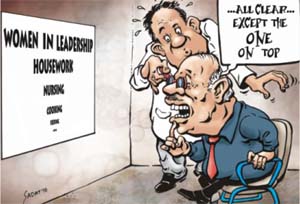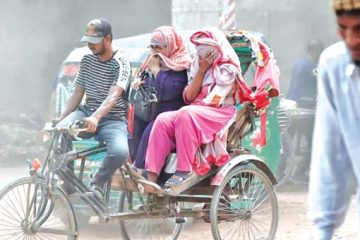Mamun Rashid
 In the 1970s to 80s, teaching and nursing were the only largely female professions. Things have changed. Women are now also commonly lawyers, physicians, bankers, investment analysts, journalists, economists, doctors, psychologists, consultants, college/university professors, pilots, defence officials, IT professionals and scientists.
In the 1970s to 80s, teaching and nursing were the only largely female professions. Things have changed. Women are now also commonly lawyers, physicians, bankers, investment analysts, journalists, economists, doctors, psychologists, consultants, college/university professors, pilots, defence officials, IT professionals and scientists.
Women have dramatically increased their numbers in professional and technical occupations for several reasons — greater educational and employment opportunities, the influence of the western mass media and the growth of individualism combined with economic hardship in families.
How do we see women in our society address concerns over how to bring balance between work and family life?
We are finding it increasingly tough to send our female colleagues home even at 9pm. They like their work and want to climb the career ladder like their male counterparts. And believe you me, they can do it. Many, if not all, do a fantastic job, with less gossip, more work and more attention to handling clients’ needs than their male colleagues.
However, for many women, combining work and family in an ever-more-competitive business world means an inevitable rise in both stress and guilt. For most women, more time spent on the job means compromising time with family, creating a high level of stress and swallowing no small amount of guilt.
Under our inherited norms, married working women find themselves torn and tired, and worrying that they may be neglecting their children and home. Wives often enter work, marriage or parenthood with fixed role expectations of themselves and others, but later fail to fulfil those expectations. This brings about a conflict between what they expect and experience. Role conflict has many consequences.
Role conflict may also lead to substandard performance and a host of other behavioural outcomes. It is also negatively related to organisational commitment, job involvement, job satisfaction and participation in decision-making. In addition, family members make the situation more stressful.
It is very difficult for Bangladeshi women to constantly communicate with their spouses because they believe Bangladeshi men are not or do not want to be aware of the growing changes in society. They also think we husbands have a hard time viewing home and family work as ‘our work’. Such views supposedly threaten marital stability. That is why it is still rare for wives to have an equal role in domestic chores and decision-making.
For all the real progress women have made in education, their choice of career and pay, only a relatively small percentage ever makes it to the top. Women make up a significant percentage of the overall labour force, yet hold only an insignificant percentage of top earning positions and an extremely negligible percentage of power titles (if not for quota-filling).
A critical element in making it to the top is being in the pipeline to do so. But women in our country also have to believe they can make it. Studies suggest, and my own experience confirms, that it is hard for women and for minorities to believe they can progress if they cannot look up and see faces like their own at the top. When highly educated women perceive a dearth of viable options and leave the workforce, the pipeline narrows further.
So how do some women balance their careers with their responsibilities as mothers and wives? It takes energy, patience, hard work and creativity. Even when a woman is given an opportunity to pursue a fabulous job in a country outside Bangladesh, she is more likely to think twice, to place family priorities above career priorities in making the decision.
On top of all the responsibilities, women often have to deal with how others judge her. There lies the dilemma of double standards: can a woman who works hard succeed both in her career and avoid being perceived as a negligent mother or wife?
No one looks at working husbands or fathers suspiciously when they travel frequently on business. Yet it is often the toughest decision for a working woman to do the same.
However, millions of women around the world somehow manage, often at the cost of their own personal time or with more modern husbands. We are seeing this happen in Bangladesh too.
Let us do a bit more for our female colleagues. I tell you, they can create wonders for you: a better workplace, mutual respect, and above all, building an environment of togetherness.
The writer is a banker and economic analyst.







